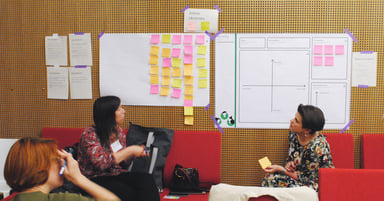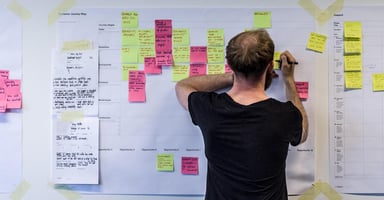The Cheat Sheet on Communication with Clients. Top Secret!

But if you're a Project Manager - it's a must-read if you want to communicate with your clients flawlessly.
Believe it or not: you can deliver the world’s greatest code, but if you have no idea how to communicate with your clients - you won’t see your company growing. Communication problems can actually be a real disaster. It’s not easy to find the right balance for communication. As a project manager, you need to learn when you should step in and be involved in a project and when to take a step back.
Here I’ll try to give you some tips on how to create a good working relationship with clients.
How it starts
Most Project Managers will know the following scenario very well: you are assigned to a new project, you gather your team, you plan tasks, have all deadlines scheduled, everyone is excited and can’t wait to start the new project (adventure time!). Then, the prep work is finished, and now all we need to do is to wait for some feedback from the client… and this is when your troubles start.
You either have no answers, or unhelpful ones. This is the moment when you want to turn yourself (or your client!) into a small, almost invisible creature and fly off with the wind somewhere no one can reach you. Sounds familiar? Worse - you’re likely to face this unpleasant process with each new project and client!
Guess what? We’re not robots!
Sometimes we tend to forget that we are all humans. That means we all differ, and our different personalities affect the way we communicate at work. The most difficult thing for Project Managers is to learn how to work with different types of clients and to adjust their method of communication to match the client’s “style”. Below you can find the most common reasons for miscommunication and the types of clients you can potentially work with.
Possible reasons for communication issues:
-
Different backgrounds and communication methods
-
Different expectations: different definitions of “done”
-
Lack of timely feedback from clients and team members
-
Inefficient communication flow: risk of getting lost in translation
-
Too much information from the client and too little time to deal with it
-
Technical issues and different levels of technical fluency
-
Differences in personality: we are only human - we may not like each other
Disclaimer:
If you’re reading this and happen to be a client, please don’t feel offended. Imagine you’re reading the script of a standup comedy performance. We bet you’ve got a similar classification of Project Managers you’ve worked with so far, which is perfectly fine. Take these characteristics with a grain of salt.
Types of clients we may meet on our way, and their characteristics:
Type 1
“I don’t know how it works but let me teach you”:
- knows best
- doesn’t like our ideas
- their ideas are the best
- constantly interrupting
- 1000 messages a day
- they change their mind a lot and expect us to deliver iterations on time.
Type 2
“I don’t know much, I like everything”:
2.1. Quiet:
- doesn’t say much during meetings
- doesn’t ask many questions
- doesn’t reply to emails
- is afraid to talk
2.2. Tell me more:
- asks tons of questions but doesn’t understand the answers
- actually doesn’t like the results - but only gives feedback when it’s too late!
Type 3
“I’m from IT”:
- very technical
- does programming him/herself or knows a lot about it
- expects similar knowledge from the PM (dev-alike background)
Type 4
“I know how to do it, you know how to do it, we both know so… let’s do it like that. Or not…”:
- has plenty of ideas, but likes our ideas too
- thinks his solutions can be better…
- but not necessarily… maybe ours
- doesn’t know what his feedback is
Type 5
“This project will SAVE the galaxy. It’s OUR life”:
- our lives depend on it
- there is nothing else we should do 24/7
- the PM has to be available on all communication channels, all the time...
Type 6
“I’m the boss. I know better. PM is my PA”:
- doesn’t want to listen to any suggestions
- gives orders
- doesn’t want feedback
- doesn’t care about iterations much (unless they change it)
- expects a thousand updates a day (call me, call me, mail me)
Sounds a little too much for one Project Manager, right?
Most importantly: what should I (the Project Manager) do?
It’s not always the client who makes communication tough. Both sides are always to “blame”. What can you do to improve it?
Learn something about your client. Again, it’s about us not being robots. Talk with clients, learn their language, show them that you want to know them better. This can help you understand their motivation, their fears and their expectations. Spending a few extra minutes during a call to have a chat (include your team too) won’t hurt anybody - it can only help you!
Get involved. Show that you’re invested in the project, that it is not “just another project” in line. It may be for you, but the clients DON’T need to know this (though, also bear in mind that, for many clients, this project will be one of many as well). They need to feel that each time they talk to you - you are 100% “theirs”. Don’t rely on written communication - 10 minutes conversation on Hangout can be more productive than an hour of exchanging emails.
Listen carefully and ask questions. Project Managers tend to forget this! We schedule calls, we make checklists, we take notes, we write summaries, we set tasks… but we don’t listen or ask questions! Don’t be afraid and do it! Ask as many questions as possible to understand what is going on. This helps a lot - especially when the client is very technical. We are always limited by time - so make a list and include anything that seems to be unclear.
Remember to have everything in writing. It is extremely important to keep records of everything you have ever discussed with your client. Don’t be overwhelmed by too many ideas and arguments. Clients will give you a lot of information - you need to filter it and make it useful. You should keep all agreements, requirements and anything that client has ever outlined. It’s a good idea to send it in daily or weekly summaries. If you ever have to discuss with your client how the project is being handled, you can always point to the notes you made.
Teach clients. You are the Project Manager and you should be an expert. That is what your clients want to see and feel. They have to know you do your job well - advise them, show them another perspective, think out-of-the-box.
Don’t overdose. You have to find a balance between taking your team’s perspective and representing the client. You have to take responsibility for your team - you should not overprotect it when you see something is going wrong. At the same time, you have to have the courage to stand up and say “no” to your clients when you see their ideas can potentially harm the project.
Don’t pretend to be someone you are not. Project Managers tend to forget their personalities when they’re at work - we’re too focused on project details. This is simply… bland. If you don’t like jokes - don’t try to make them just because you’ve read that this is a good way to start conversation. Find your own way. Use the skills you have.
To sum up...
Communication is always key. At the end of the day - one of the most important roles Project Managers have is to strengthen relationships with clients. Knowing your clients and having a good communication strategy is crucial at all stages of a project. It’s also about putting effort into getting to know your clients, being open to their ideas and trying to understand their perspective. With them knowing your working philosophy (general workflow and ideas you have to make their product great), it will be much easier to create a customer-manager dream team.
TL:DR? Need something more visual? Here's a presentation on communication tactics that sums up the post. Jump in!
Just like I mentioned, asking questions is a crucial element for mutual communication. Check out the 10 questions to ask a Project Manager before starting a project you will know what to expect and how to prepare yourself for meetings. Enjoy!















.jpg?width=384&height=202&name=Netguru-Biuro-2018-6425%20(1).jpg)









